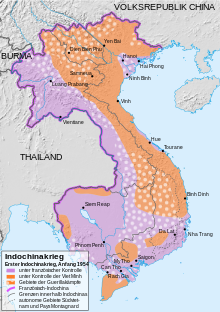Opération Atlante
The Opération Atlante was a French military operation during the Indochina War . It began on January 20, 1954 and ended in March of the same year. The aim of the operation was to smash the structures of the Viet Minh guerrilla in a large part of central Vietnam by deploying mainly local troops . The operation yielded very little results and shattered French belief in the military efficiency of their Vietnamese client state, which was being established.
background
For the French military leadership in the Indochina War over General Henri Navarre , a division of the country became increasingly likely. In order to secure a power base for a pro-French state in Cochinchina and to be able to withdraw French forces from the conflict, the Bảo Đạis regime was equipped with its own army . Navarres saw the success of Vietnamization as essential for a favorable political conclusion to the war for the French side.
Course of operation
As a first practical test for the Vietnamese National Army, it was supposed to clean a Viet Minh stronghold in central Vietnam from the guerrillas in conjunction with a few troops of the French expeditionary force . The 5th Integrated Zone ( Lien Khu 5 ) designated as the target of the operation comprised 30,000 Viet Minh fighters distributed in many hundred villages between Tourane and Nha Trang . The guerrilla structures were spread over an area of nearly ten thousand square kilometers and two million inhabitants. Navarre planned a six-month offensive, which would begin in January and would be divided into several phases, in which the guerrilla structures would be gradually pushed back. Navarre appointed General Guy de Beaufort to command the operation .
Navarre provided 21 infantry battalions from the National Army under construction and two motorized brigades from the Expeditionary Corps for Operation . Depending on the course of the operation, the units should receive massive support from the air force, navy and paratroopers. The Viet Minh reacted evasively to the beginning of the French operation in January 1954, but in the following months they were able to disrupt the operations of the French more and more with ambushes and assault-like coups. At An Khe, the French troops had to face costly battles. In the course succeeded the Viet Minh even temporarily Pleiku to isolate a strategically important access to the Central Highlands and so to force the French there to the loss-making use of its parachute associations. The French leadership had to set back the objectives of the operation several times, the planned third phase only took place to a rudimentary extent.
consequences
The air support operations for Atlante weakened the French air supply during the ongoing battle for Điện Biên Phủ . The performance of the Vietnamese units was assessed by Navarre as disappointing, he reported to his superior Paul Ély that the pro-French armed forces of Vietnam would not be capable of serious operations on their own for years to come. Navarre publicly declared the first two phases of the offensive to be successful.
historiography
In the Vietnamese literature about the Indochina War, together with the skirmishes in the context of the Opération Atlante and the battle of the Mang Yang Pass as a battle in the central highlands ( Chien Dich Tay Nguyen ) considered as a coherent operation.
Individual evidence
- ^ A b c d Martin Windrow: The Last Valley - Dien Bien Phu and the French Defeat in Vietnam , Cambridge 2004, pp. 278–282
- ^ Jacques Dalloz: Dictionnaire de la Guerre d'Indochine , Paris, 2006, p. 21
- ↑ Christopher E. Goscha : Historical Dictionary of the Indochina War (1945-1954) , Copenhagen, 2011, p. 46
